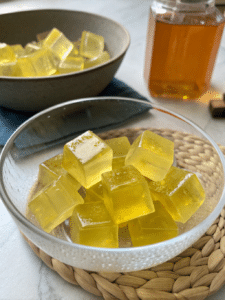
The Story Behind the Japanese Pink Salt Trick
A Strange Ad, A Familiar Ingredient
Japanese pink salt trick ads started flooding the internet recently, often with phrases like “one teaspoon before bed melts belly fat.” I saw one while looking for slow cooker chicken ideas and had to laugh. As someone who actually cooks with Himalayan salt, I knew there was no magical fat-burning secret hiding in my spice cabinet.
Hi, I’m Deen – welcome! I’m a self-taught home cook based near Asheville, NC. My love for cooking began during a chaotic chapter of life, and over time, my kitchen became my calm. These days, when I see food fads online, I can’t help but investigate, and that’s what led me to the so-called Japanese pink salt trick. I dug in because I wanted to know if there was even a grain of truth (pun intended). Spoiler: there wasn’t.
This trick doesn’t show up in real Japanese culture or cuisine. I couldn’t find it in miso soups, fermented broths, or traditional wellness practices. In fact, the pink salt used is Himalayan, which makes the “Japanese” label nothing more than a psychological sales tactic. I wrote more on this in What Is the Pink Salt Trick for Weight Loss.
Marketing Myths vs. Real Kitchen Use
Let’s be clear: pink Himalayan salt has trace minerals and a great crunch, but it doesn’t torch body fat. What it does do? It elevates meals like my teriyaki chicken crock pot recipe with a subtle earthy flavor. That’s it.
Still, viral posts turn this common salt into a “detox elixir” when mixed with lemon and water. Throw in a fake doctor endorsement, a countdown timer, and a supplement trial offer, and you’ve got yourself a scam funnel. It’s not wellness, it’s marketing 101. But you’re here, and I’m glad. Because we’re going to untangle this trick and look at what’s real, what’s shady, and what to do if you’ve been caught in the hype.
In this Article
Key Takeaways: What You Need To Know
- The Japanese pink salt trick isn’t Japanese and lacks scientific credibility.
- It’s a buzzword used in deceptive weight loss supplement schemes.
- Knowing what’s real vs. marketing hype can help you avoid wasting time and money.
What Is the Japanese Pink Salt Trick, Really?
False Promises and Viral Claims
The Japanese pink salt trick is often introduced through a clickbait video or ad claiming that pink salt, especially when consumed before bed, can “melt belly fat overnight.” The visual formula is nearly always the same: soft music, a woman in her late 40s claiming she tried everything, a mysterious “Asian secret” passed down for centuries, and a miraculous transformation that supposedly happened with just salt, lemon, and warm water.
Let’s break it down. The product being sold is usually not the salt itself, but a “limited-time” supplement tied to a subscription plan. The salt trick is the bait. It’s often described as something your doctor doesn’t want you to know, or that’s been “hidden by Big Pharma.” The ad quickly transitions into a supplement sales page with flashy claims, ticking clocks, and fake reviews.
These videos and pages are built for virality. Their purpose is to convert viewers into customers through urgency and manufactured trust. You’ll often see phrases like “only available in Japan” or “used in remote Okinawan villages”, which are completely fabricated. I dive deeper into how this plays out in the Eight Labs pink salt trick article.
Why It’s Called “Japanese” – The Psychological Trick
So why call it Japanese at all? Because it’s marketing gold. The word “Japanese” signals purity, ancient wisdom, and minimalism to Western audiences, even if the product has zero connection to Japan. It makes the entire scheme sound more believable and exclusive.
This isn’t a new tactic. From “French beauty secrets” to “ancient Ayurvedic detox,” scams love to attach exotic origins to common ingredients. In this case, Himalayan salt is rebranded as a Japanese miracle, creating a false sense of legitimacy.
The pink salt trick is not rooted in Japanese culture, nor is it supported by clinical research. But the psychological trick works, people click, curious to learn more. Unfortunately, what they often find next is a high-pressure sales funnel.
Next, we’ll explore whether there’s any scientific support for pink salt aiding weight loss, and how it really stacks up against regular salt.
Is There Any Scientific Basis for the Japanese Pink Salt Trick?
The Nutritional Truth About Pink Salt
The Japanese pink salt trick keeps popping up across social media, often framed as a natural, ancient method to lose weight. But does it hold any real scientific weight? Short answer: no. The longer answer is a little more interesting.
Pink Himalayan salt, the core ingredient in the so-called Japanese pink salt trick, contains up to 84 trace minerals. That sounds impressive, but when you break down the actual nutritional content, most of those minerals exist in microscopic amounts. Here’s how pink salt compares to regular table salt:
| Type of Salt | Main Components | Health Impact |
|---|---|---|
| Pink Himalayan Salt | Sodium Chloride + Trace Minerals | Same sodium risks as regular salt |
| Table Salt (Iodized) | Sodium Chloride + Iodine | Can help prevent iodine deficiency |
While pink salt does have trace amounts of magnesium, calcium, and potassium, you’d need to consume dangerous amounts just to see any meaningful impact. And with all salts, pink or white, high intake increases your risk of high blood pressure and fluid retention, not weight loss.
The bottom line? There’s no clinical proof that the Japanese pink salt trick causes fat loss. In fact, it could be harmful if used excessively.
Does Lemon and Pink Salt Water Help?
Now, some versions of the Japanese pink salt trick combine lemon juice and warm water with the salt. The idea is that this “flushes toxins,” balances pH, and jumpstarts digestion. But again, there’s no science behind these claims. Your body already detoxes through your liver and kidneys, not lemon water.
If there’s any benefit to this morning ritual, it’s likely from hydration and the placebo effect. Drinking warm lemon water on an empty stomach may help digestion for some, but it’s not a magic pill.
I put together a simple version of the viral recipe in this pink salt trick recipe article to show what people are actually drinking. It’s a mix of lemon juice, water, and a pinch of salt, nothing harmful in moderation, but also nothing miraculous.
So far, every part of the Japanese pink salt trick story has pointed toward clever marketing, not science. Next, we’ll look at what really happens when you click those “one trick before bed” ads, and how deep the deception goes.
The Dark Side of the Japanese Pink Salt Trick
Scam Funnels, Fake Doctors, and Clickbait Chaos
Once you’re intrigued by the Japanese pink salt trick, it’s only a matter of time before you’re funneled into a digital trap. These aren’t harmless kitchen tips, they’re high-converting ad campaigns designed to sell you expensive supplements.
Clicking one of those “one trick before bed” ads often takes you to a fake news site. It might look like a health blog or a women’s magazine, complete with “exclusive interviews” and before-and-after photos. You’ll likely see a fake doctor, sometimes with stolen credentials, endorsing the Japanese pink salt trick as a groundbreaking fat-burning breakthrough.
But the truth is, these pages use prewritten scripts copied across thousands of domains. They rotate product names (like BellyFlush, GutSlim, or Ignite Drops), but the format stays the same: emotional testimonials, fabricated research, and timers urging you to “claim your bottle before midnight.”
Sometimes, these ads link to phony videos labeled “as seen on Dr. Oz” or claim to be part of a Japanese hospital study. I saw one that even listed a non-existent medical institute to sell the Japanese pink salt trick story. You can read a breakdown of this deception in Does the Pink Salt Trick Work for Weight Loss?.
The Supplements Being Sold
Here’s where it gets dangerous. These supplement pages sell products with vague labels like “proprietary metabolism support blend.” They often contain ingredients like:
- Garcinia cambogia (banned in some countries for side effects)
- Raspberry ketones (proven ineffective in studies)
- Apple cider vinegar extract (in powdered form with no real benefit)
None of these ingredients have been approved by the FDA for weight loss. Worse, many sites automatically enroll you in a “trial offer” that charges your card monthly, often without consent. People thinking they’re trying the Japanese pink salt trick end up subscribed to a recurring bill they can’t cancel easily.
The worst part? Many of these companies disappear within months. They operate under new names, switch domains, and relaunch the same scheme with a slightly different product.
So no, this isn’t just about pink salt anymore. The Japanese pink salt trick is the gateway to aggressive supplement scams that target vulnerable people looking for help.
Next, we’ll unpack why these scams are so effective, and how the emotional manipulation works.
How the Japanese Pink Salt Trick Hooks Millions
Emotional Triggers and Fake Testimonials
The Japanese pink salt trick isn’t just a quirky internet trend , it’s a carefully engineered emotional hook. These scams know exactly what they’re doing. They prey on the frustration of people who’ve tried everything to lose weight. When traditional diets don’t work or gym memberships go unused, the promise of a simple trick, especially something “Japanese” and “ancient”, feels comforting, believable, and worth a click.
But it’s all smoke and mirrors. The people in those testimonials? Often stock photo models or actors. Their stories are fabricated, or sometimes stitched together from unrelated health blogs. You’ll see “Susan from Nebraska” saying the Japanese pink salt trick melted 47 pounds off her frame in 30 days. Yet the fine print reveals it’s a dramatization, and the before-and-after images are lifted from unrelated websites.
Even the wording is manipulative. Words like “new Japanese discovery” or “just one teaspoon before bed” are repeated because they sound safe and intriguing. In reality, these ads are filled with misinformation and lead users directly into a subscription scam.
The worst part? This tactic is effective. It convinces smart, health-conscious people to try something that doesn’t exist. And it hides behind phrases like “natural,” “ancient,” and “doctor-approved”, all to legitimize a baseless claim.
Why People Fall for the Japanese Pink Salt Trick
It’s easy to judge, but the truth is, these scams are designed to bypass logic and tap directly into emotion. The Japanese pink salt trick is built around the idea of effortless weight loss. It doesn’t ask you to give up carbs or count calories, just sprinkle some salt and sip water. That’s extremely tempting when nothing else has worked.
Also, the presentation is polished. The sites mimic legitimate wellness blogs and quote fake studies. Some even list “testimonials” from dieticians who don’t exist. It’s designed to feel authentic, especially for users unfamiliar with spotting digital red flags.
Another reason the Japanese pink salt trick works is because it seems harmless. After all, what’s the worst that could happen from drinking a bit of salt and lemon water? But the real danger isn’t the drink, it’s the ecosystem around it. The upsells, the auto-billing, the fake endorsements, that’s where the damage happens.
We covered this kind of misdirection in What Is the Pink Salt Trick, where we traced how users are lured in by one claim but sold something entirely different.
Next, we’ll walk through what to do if you’ve already clicked, bought, or subscribed to one of these Japanese pink salt trick scams, and how to protect yourself moving forward.
What To Do If You Clicked or Bought Into the Japanese Pink Salt Trick
How to Know If You’ve Been Scammed by the Japanese Pink Salt Trick
If you’ve clicked on an ad or ordered a product because of the Japanese pink salt trick, you’re not alone. These scams are built to look legitimate, and millions of people fall for them. The trick usually starts with a health video promising results from just pink salt and lemon, but within minutes you’re being sold a “metabolism booster” or “fat flush tonic” linked to the Japanese pink salt trick.
So how can you tell if you’ve been pulled into one of these traps? Here are a few clear warning signs:
- You were offered a “free trial” but asked to enter credit card info.
- The company name on your bank statement doesn’t match the site you ordered from.
- Customer service numbers are disconnected or unresponsive.
- The product came with no clear instructions or ingredient list.
- You’re being charged monthly without consent.
If any of this sounds familiar, you may be a victim of a Japanese pink salt trick-related scam. It’s important not to ignore this, these companies rely on silence and embarrassment to continue profiting.
Steps to Take If You Ordered from a Japanese Pink Salt Trick Ad
If you bought a product from one of these Japanese pink salt trick offers, take immediate action. Start by contacting your bank or credit card company. Request to block future charges and report the vendor as fraudulent if needed.
Next, check if the company has a real website or refund policy. Most don’t. If you’re unable to get help, file a report with the Federal Trade Commission (FTC) at reportfraud.ftc.gov, a trusted .gov resource.
It’s also worth scanning your email and bank records for follow-up charges. These schemes often enroll people in “wellness clubs” or send follow-up offers disguised as unrelated health products, all tied back to the Japanese pink salt trick.
Even if you never entered payment info, clicking on a Japanese pink salt trick ad may have led to a data grab. Your email or personal info could now be on a marketing list. Mark those messages as spam and block the sender immediately.
Unfortunately, some of these scam operations operate outside U.S. law enforcement reach. That’s why it’s critical to stay aware and act quickly. Every report makes it harder for them to continue.
In the next section, we’ll pivot from scams to solutions, including healthy alternatives to the Japanese pink salt trick that actually support your wellness goals.
Safe Alternatives and Smarter Habits Than the Japanese Pink Salt Trick
Real Recipes That Work Better Than the Japanese Pink Salt Trick
Let’s be honest, the Japanese pink salt trick is just a gimmick. If weight loss came down to drinking salted lemon water, we’d all be doing it. The real path to wellness starts with consistency, whole foods, and habits that last longer than a 30-second ad.
Instead of chasing fads like the Japanese pink salt trick, try simple recipes that actually support digestion and energy naturally. Here are two of my go-to favorites:
- My Apple Cider Vinegar Lemon and Honey drink is packed with gentle acidity and antioxidants. It’s great first thing in the morning, hydrating, tart, and satisfying.
- Another excellent option is Lemon Balm Tea for Weight Loss. This calming, belly-friendly tea won’t burn fat magically, but it helps reduce stress and bloating, both important for sustainable weight loss.
Both of these drinks support your goals without pretending to be magical shortcuts. They don’t rely on deceptive marketing or fake science. And most importantly, they respect your body and your time.
How to Spot a Japanese Pink Salt Trick-Type Scam in the Future
The best defense against the Japanese pink salt trick and similar scams is awareness. Here’s a simple checklist to follow anytime you’re tempted by a “too good to be true” weight loss ad:
- Does it claim overnight results from a single “trick”?
- Is there a countdown timer or “limited supply” pressure?
- Does the website list any scientific studies or credentials?
- Are you asked to buy before getting full ingredient info?
- Can you find any real customer reviews outside of their own site?
If you answered yes to most of those, walk away, it’s likely just another Japanese pink salt trick-style scam in disguise. For a full list of recognized internet scams, check out this Wikipedia reference on online fraud types.
The truth is, there’s no shortcut to health. But there is joy in learning how to cook, discovering what feels good for your body, and building habits that last longer than a fake “salt detox.” And that’s why I built Deen Recipes, to help you find trustworthy, delicious, and honest food inspiration.
Frequently Asked Questions About the Japanese Pink Salt Trick
What is the Japanese Pink Salt Recipe?
It’s a mix of pink Himalayan salt, lemon juice, and warm water, promoted online as a weight loss drink. Despite its name, the Japanese pink salt trick has no connection to Japanese culture or medicine. It’s often used to lead people into supplement sales funnels.
Is there any scientific evidence that pink salt helps with weight loss?
No. The Japanese pink salt trick isn’t backed by any science. Pink salt contains trace minerals, but none that trigger fat loss. It’s just salt, not a metabolism booster.
Why do these scams use the word “Japanese”?
The term “Japanese” is used to make the Japanese pink salt trick sound exotic and ancient. It adds false credibility, even though the salt is from the Himalayas, not Japan.
What happens if I click on one of these ads?
Clicking a Japanese pink salt trick ad usually leads to a fake health page or supplement sales funnel. Some sites also harvest personal data or enroll you in recurring billing.
What kinds of supplements are being sold through these scams?
Scams often push pills with garcinia cambogia, raspberry ketones, or fake apple cider vinegar blends. These products lack clinical proof and may cause side effects.
Are these supplements safe?
Usually not. Most Japanese pink salt trick-linked products are unregulated, and their manufacturers often vanish after complaints arise.
Can I actually lose weight with pink salt and lemon juice?
Not really. Drinking lemon water may support digestion, but the Japanese pink salt trick doesn’t melt fat or increase metabolism.
How do I know if I’ve been scammed?
Red flags include surprise charges, fake contact info, and vague product labels. If it ties back to the Japanese pink salt trick, it’s likely a scam.
What should I do if I already bought one of these products?
Contact your bank, stop future charges, and report the incident to FTC.gov. Keep all records.
Why do people fall for this scam?
The Japanese pink salt trick uses emotional stories, fake testimonials, and urgency tactics to manipulate people into acting fast.
Has this scam been reported by authorities?
Yes. It’s been flagged to the FTC and other consumer watchdogs for false health claims and unauthorized billing.
How can I avoid scams like this in the future?
Always research products, avoid miracle claims, and never buy supplements from ads tied to the Japanese pink salt trick or similar fads.
Conclusion: The Japanese Pink Salt Trick Is Just That, A Trick
By now, it’s clear that the Japanese pink salt trick is not a miracle weight loss discovery, it’s a viral marketing ploy designed to sell unregulated supplements. Despite its calming name and “natural” appeal, there’s no connection to Japanese culture, no clinical evidence, and no reason to believe it works.
These types of scams succeed because they blend hope, desperation, and exotic-sounding claims into one tempting pitch. But knowledge is your best defense. Once you understand how these tricks work, you can spot them a mile away, and help others avoid them too.
Instead of chasing shortcuts, focus on real habits that nourish your body. Hydration, whole foods, and simple routines matter far more than any pink salt drink. If you’re looking for honest ways to support your health, try one of my go-to recipes like apple cider vinegar lemon and honey or lemon balm tea.
So the next time you see an ad promising to melt belly fat with a teaspoon of salt before bed, remember this: there are no secrets, just scams wrapped in soothing colors. The Japanese pink salt trick doesn’t belong in your health journey. But honest food, mindful cooking, and evidence-based choices absolutely do.
You deserve better, and better starts right here, one recipe at a time.





What about the product called prozenith? I think I got scammed and over charged. I contacted my cc company, changed my account # . Never got an order #, etc. Claims it was Opra and a Dr. Ana. I’m not happy! HELP!
I’m really sorry to hear that happened to you. Unfortunately, there have been a lot of scams online using Oprah’s name or fake doctors to push products like that. Oprah has publicly stated she has no involvement with these companies. You did the right thing by contacting your credit card company and protecting your account. If you still see any suspicious charges, keep following up with your bank. For peace of mind, you may also want to report the scam to the FTC at reportfraud.ftc.gov
.